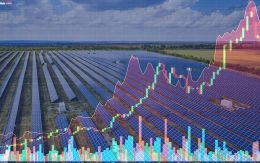Climate change is the biggest challenge of the 21st century. COP21 (1), held in Paris in late 2015, marked the beginning of a global acknowledgement of climate change, with a historic agreement that set up a global framework for cooperation to combat global warming. The 195 signatory countries (plus the European Union) undertook to contain the rise in global average temperatures to well below 2°C compared to pre-industrial levels, while making every effort to limit it to 1.5°C.
Five years later, in its sixth report, published in August 2021, on the consequences of global warming, the IPCC (2) sounded the alarm once again in the face of accelerating climate change, reminding us of the urgency to act.
This report should serve as a scientific basis for the negotiations at COP26, which will be held in Glasgow on 1-12 November 2021. Participants will have the opportunity to take stock of their actions and will have to debate the need to become more ambitious and increase the resources provided to strengthen collective action in order to achieve the objectives set in the Paris Agreement.
With climate change top of mind, staff in the Economic Research Department have been working hard to produce a series of webzines on decarbonising the economy. Reducing carbon dioxide emissions, the main greenhouse gas produced by human activity, is one of the cornerstones of climate action, with the ambitious objective of achieving carbon neutrality by 2050. It is also one of the pillars of Crédit Agricole group’s strategy.
This first webzine focuses on the energy sector. Energy is the largest source of carbon emissions but also a key component in production. Energy consumption evolves in line with growth in activity. As such, decarbonising the energy mix is a major challenge when making the transition to a sustainable, low-carbon economy.
In this webzine, we will discuss the massive investments needed to make this energy transition a success. We will also look at innovation as a key success factor in decarbonising energy, focusing in particular on six high-stakes technologies. We will see how decarbonisation will not mark the end of energy geopolitics. Indeed, the transition will create winners and losers, but we will also see new players emerge.
In future webzines, we will address the topics of decarbonising industry, decarbonisation financing and decarbonising consumption.
We look forward to engaging in dialogue with you over the coming months, but for now, we hope you enjoy this issue!
Translation of the French version published on 25 October 2021
(1) COP refers to the “Conference Of Parties”, which brings together the signatory states of the UN Framework Convention on Climate Change.
(2) Intergovernmental Panel on Climate Change












